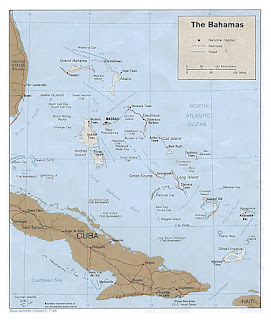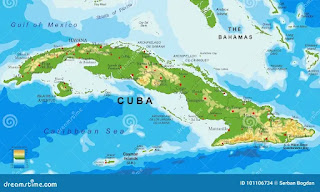Google Ads
Wednesday, April 10, 2024
We Honor The Cuban Fishermen, whose Journeys to Ragged Island and Beyond are Foundational Tales of Caribbean Solidarity
Tuesday, April 9, 2024
Why do Latin America and the Caribbean have low learning levels?
If learning were a disease, we would be talking about a global pandemic
Understanding The Learning Crisis: Where Are Students with Learning Gaps Located?
What happened in Latin America and the Caribbean? We saw that three out of four 15-year-old students lack basic skills in mathematics, and almost half do not understand what they read.
We partnered with the World Bank to publish the report Learning Can’t Wait: Lessons for Latin America and the Caribbean from PISA 2022. We sought to better understand the reasons behind this learning crisis in the region.
And, just as with child mortality, we know where and why.
Where?
Also, in low—and middle-income countries, on average, 15-year-old students in the region lag five years behind the average student in OECD countries. If we compare Latin American and Caribbean countries with those above the OECD average, the gap is 12 years of learning compared to Singapore, which leads the PISA rankings.We not only know where the learning crisis is located and in which countries these learning challenges exist, but we also know who the lagging students are within countries.
There is an enormous inequality in learning by socioeconomic status: 88% of low-income students underperform in mathematics, compared to 55% of the wealthiest students. That’s a difference of more than 30 percentage points between the two groups.
Why do Latin America and the Caribbean have low learning levels?
We not only know where, but we know why:
- First, we are not investing enough in education. Our countries invest, on average, three times less in education than OECD countries.
- There is also a relationship between investment and learning. With the current level of investment, we could improve learning outcomes. Therefore, there is room for efficiency. The countries in the region are below the trend line, which means they could achieve better learning results for every dollar they invest.
- Third, there is a distribution problem and an equity issue. The teacher is the main input an education system has to achieve learning. And what we see is that this main input is unequally distributed. The highest-quality teachers are systematically in schools where the highest-income students attend.
- Measure more and better. Measuring learning means knowing where we stand and providing a sense of purpose and direction. It indicates where we want to be in the coming years.
- Investing more. Countries in the region need to invest more.
- Investing better. Investing better means generating efficiencies and spending better on the one hand. On the other hand, it means investing in programs that we know are effective and can improve learning.
- Early literacy programs. We know, for instance, that if we offer good literacy programs to young children from an early age, we can improve their reading skills by 30%. “Let’s All Learn to Read” is one such solution.
- Intercultural bilingual education. We also know that when we culturally contextualize the learning of mathematics, indigenous children develop 50% stronger math skills.
- Remote tutoring. We also know that when we provide personalized support to the most vulnerable, lagging students through highly cost-effective remote tutoring, we can accelerate their learning by 30%.
- School feeding programs. We also know that offering school meals to students increases their participation in school. We see a 9% improvement in school attendance.
- Education management and information systems. Finally, having management and information systems is crucial. They not only help us generate efficiencies but are also essential to ensure equity. This data allows us to distribute resources more equitably in education systems to compensate for student differences.
We know the magnitude of the problem. We have studied it in depth. We know where the problem lies and why we are facing this challenge. And we also know the effective solutions. We have done it before; we can do it again. The main challenge is how to transform the region’s education systems at scale. Because learning can’t wait, these generations of children and youth cannot wait.
Thursday, March 7, 2024
Haiti: Some 5.5 million people — that’s nearly half of the country’s population — need humanitarian assistance
The Rapidly Deteriorating Security Situation in Haiti and its Impact on Haitian Civilians
Turning to Haiti, the Office for the Coordination of Humanitarian Affairs reports that the escalation of violence in several neighbourhoods in the capital, Port-au-Prince, has led to some [15,000; corrected below] people being forced to flee their homes. Most of these people had already been displaced previously.
Despite the security constraints, our humanitarian partners on the ground have begun to respond to these new displacements by providing food; hygiene and health kits; mattresses, blankets and sheets; as well as lamps.
The World Food Programme (WFP) and its partners have delivered some 5,500 hot meals to some 3,000 people living in the three new displacement sites, while the International Organization for Migration (IOM) has started distributing emergency shelter material to more than 300 families.
The humanitarian community in Haiti calls on all sides to put an immediate stop to the violence; to allow safe access to the people in need; and respect human rights and humanitarian norms and standards.
As a reminder, some 5.5 million people — that’s nearly half of the country’s population — need humanitarian assistance.
This year’s $674 million Humanitarian appeal for Haiti is just 2.5 per cent funded; that means it had received only $17 million.
Tomorrow afternoon, the Security Council is scheduled to hold a private meeting on the situation in Haiti. The head of our mission there — Maria Isabel Salvador — is expected to brief on the United Nations’ behalf; that will be done virtually.
I also want to reiterate that the Secretary-General is of course deeply concerned about the rapidly deteriorating security situation in Haiti and its impact on Haitian civilians.
He calls for urgent action, particularly in providing financial support for the Multinational Security Support mission, which is — as a reminder — is not a UN peacekeeping force. This force will need to address the pressing security requirements of the Haitian people and prevent the country from plunging into further chaos.
He also calls on the Government of Haiti and other political actors to swiftly agree to the necessary steps to advance the political process towards the restoration of democratic institutions through the holding of elections.
Sunday, February 18, 2024
The Deepening Human Rights Catastrophe in Haiti
Gang violence is affecting all communes in the Port-au-Prince metropolitan area, as gang members continue to clash for control of territory and have escalated their activities in areas outside the capital
- Haitian lives depend on the deployment, with no further delay, of the Multinational Security Support Mission in Haiti (MSS), to support the National Police and bring security to the Haitian population, under conditions that comply with international human rights norms and standards -
GENEVA (9 February 2024) – UN High Commissioner for Human Rights Volker Türk on Friday issued an urgent warning about the deepening human rights catastrophe in Haiti, after figures showed that January was the most violent month in more than two years.
Friday, February 9, 2024
A Vision for an Holistic and Adaptive Conservation Model for The Bahamas
The challenges facing The Bahamas in conservation and climate change mitigation
Thursday, January 4, 2024
US Congressmen Criticized Trump's Inclusion of Cuba on the Arbitrary and Unilateral List of State Sponsors of Terrorism and Urged Biden to Revoke It
U.S. Congressmen Ask Biden to Remove Cuba from Terrorist List
By Prensa Latina
Democratic congressmen from Massachusetts asked U.S. President Joe Biden to remove Cuba from the list of sponsors of terrorism, a designation issued at the end of Donald Trump's administration, The Hill newspaper reported.
Members of Congress criticized Trump's inclusion of Cuba on that arbitrary and unilateral list of State Sponsors of Terrorism and urged Biden to revoke it.
"It was a vindictive action taken by the Trump administration in January 2021 when it left office, and the policy should have changed by now," Democrats Jim McGovern and Ayanna Pressley wrote in a December letter that was not made public until now, according to the newspaper.
"In fact, Cuba and the United States have a bilateral counterterrorism cooperation agreement in place," the two congressmen stressed in the missive, also signed by Senators Elizabeth Warren and Ed Markey, and Representatives Seth Moulton, Lori Trahan and Stephen Lynch.
The Democrats insisted on Biden's unfulfilled campaign promises on reviewing some of the coercive measures adopted by Trump (2017-2021) against Cuba.
"As a candidate for president, you promised to address a new engagement with Cuba and return to the policy initiated during the Obama-Biden administration, and we support you in this commitment," they reminded the current occupant of the Oval Office.
Trump included the Caribbean country on that list during his last week in office, and this imposed severe restrictions on the island's access to international financial markets, which limits its ability to do business with other countries and entities, which are forced to choose between trading with the U.S. or Cuba, the article added.









